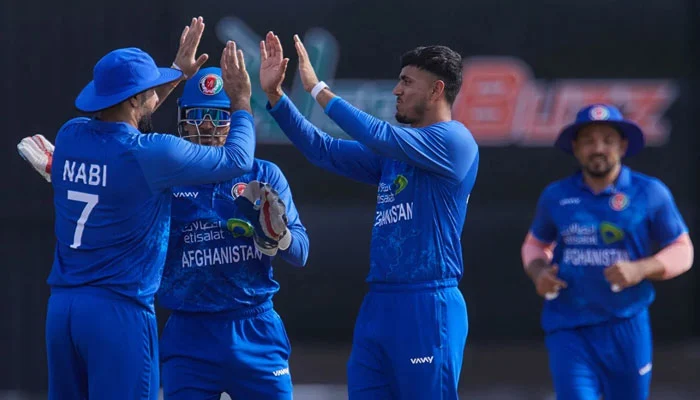Afghanistan captain Rashid Khan has stressed that his side is entering the upcoming T20 international tri-series in Sharjah without “specific targets,” choosing instead to focus on consistent performance and putting in their maximum effort on the field. The tri-series, which kicks off on Friday, features Afghanistan, Pakistan, and the United Arab Emirates, and will serve as a key warm-up ahead of next month’s Asia Cup, also in the UAE.
Also Read: PCB Awards Domestic Contracts to 65 Women Cricketers for 2025-26
Afghanistan’s recent global performances have been groundbreaking, including a semi-final appearance at last year’s T20 World Cup held in the United States and the Caribbean. The team also came close to reaching the last four at the 2025 ODI Champions Trophy in Pakistan. These results build on their strong showing at the 2023 one-day World Cup, where Afghanistan secured statement victories over cricketing heavyweights England, Pakistan, and Sri Lanka.
Despite these achievements, Rashid Khan remains cautious. “We do not have specific targets, and we do not want to put extra pressure on our players,” he said during a press briefing on Thursday. “Our target is to play the brand of cricket we have played over the years. The main target is to put in 200 per cent effort on the ground.”
Rashid also highlighted the advantage of Afghan players participating in T20 leagues worldwide over the past few months, ensuring they remain match-ready despite not playing official T20 internationals. Afghanistan’s confidence is further boosted by their prior success against Pakistan, winning a T20I series 2-1 at the same Sharjah venue in 2023.
The 16-man Afghan squad for the tri-series includes a mix of experienced campaigners and emerging talent. Spin options feature Rashid himself, alongside Mujeeb Ur Rahman, Mohammad Nabi, Noor Ahmad, and fast-rising mystery spinner AM Ghazanfar. The tri-series trophy was unveiled ahead of the opening match, signaling the beginning of a competitive preparation period for all participating sides.
Meanwhile, Pakistan is entering the series amid a transition phase. The national side has seen recent disappointments, including an early exit from the last T20 World Cup and a winless campaign at the 2025 Champions Trophy. Pakistan suffered a 2-1 T20 series defeat in Bangladesh earlier this year but bounced back with a 2-1 series victory over the West Indies.
Under new captain Salman Agha, Pakistan is working to rebuild its T20 squad, with former skippers Babar Azam and Mohammad Rizwan absent from the team. “We are trying to build a team, and this tri-series and then the Asia Cup will be a good opportunity to achieve that,” said Agha. “We know both these events will be challenging, but we are ready.”
The tri-series format will see all three teams play each other twice, with the top two sides advancing to a final scheduled for September 7. The Asia Cup, beginning on September 9, will feature defending champions India, along with Sri Lanka, Bangladesh, Oman, and Hong Kong. Both the tri-series and the Asia Cup will serve as vital preparation for the 2026 T20 World Cup, to be hosted jointly by India and Sri Lanka.
For Afghanistan, the focus remains on consistency, teamwork, and effort rather than results-driven targets. Rashid Khan’s approach reflects a desire to maintain the team’s steady growth and build on their recent successes in international cricket. As the tri-series gets underway, fans will closely watch the performances of both established stars and emerging talents, assessing Afghanistan’s readiness for the challenges ahead in the Asia Cup and beyond.


